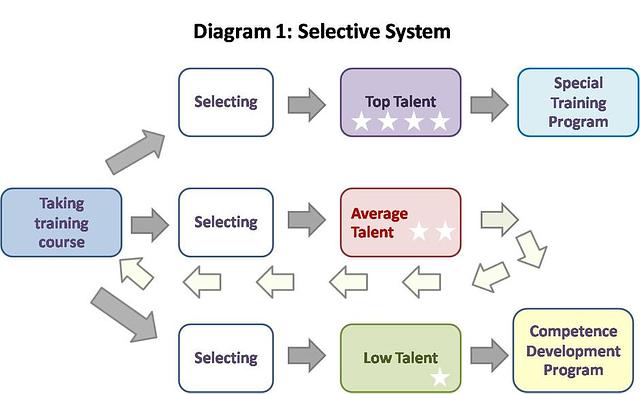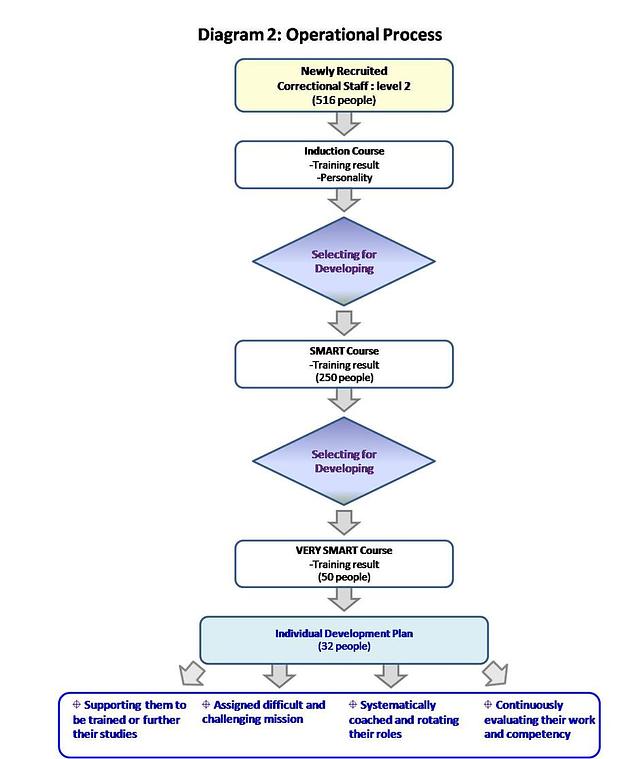Talent Management in Corrections Department
Talent Management in Corrections Department
Nathee Chitsawang
Pimporn Netrabukkana
· Introduction
Currently, many organizations have started to appreciate the importance of ‘Talent Management’ since one of the factors making organizations become astonishingly successful in achieving institution’s goal is utilizing talented people in implementing competitive strategies and solving problems. Because of this, the human capital management has been increasingly adopted by effectively making use of ‘human resources’ as much as possible. By doing so, the organizations have to outlay good management system to keep highly competent people and support their personal development in order to make them be a powerful force for organization.
Thai Department of Corrections is also an organization which encounters serious problems about attracting and retaining people of great knowledge and remarkable ability to work for the Department. One of difficulties in recruiting new staff partly comes from the governmental regulations which are based on equality and transparency. Because of this, there is less opportunity to recruit talented people to work. Consequently, the Department has to revise effective strategies towards human development, adapt to the competitive environment as well as successfully accomplish the department’s mission. Talented staff who have outstanding ability should conduct the operation and devise strategy to run organization for best practices, and also enhance the sustainable development of the organization. Because of the importance of human resource management mentioned above, it is extremely crucial to set the program for searching, screening and developing those who have enormous capability in the Thai Department of Corrections.
- Target Groups
To search and support top talented staff of Department of Corrections, the preliminary step is to carefully separate staff into two target groups;
- The middle level executives who will be promoted to work as the superintendents in the future
- The operational staff who have been newly recruited to the department
Both of these groups have to go through quite the same operational processes, starting with the ‘superintendent training course’ for group A and ‘the correctional staff induction training course’ for group B respectively. Then, they will be entering the screening and selective system to choose the top talents and in turn develop them to be supremely talented people. As for those who are not qualified or who are in the group of average talent, they will need to retake the same training course. And, this group of people has a chance to be chosen to join top talent group again. To clearly understand the process, the diagram of procedure is showing below:

- Screening and supporting highly competent people in operational level
To search and support highly competent people in operation level, the staff will firstly join the induction training course. This year, there exist 516 newly recruited staff. Then 2 months later, this group of staff will be chosen to attend higher level course called ‘SMART’ which 200 staff will be trained for 1 month by dividing them into 4 groups (50 people each). After that, they will be selected again to take 1 month ‘VERY SMART’ course. In this course, there will be merely 50 staff having appropriate qualification and at the final stage, when the VERY SMART program is terminated, there will be 32 fully qualified people left to have their individual development plan. This plan is composed of the following features:
- Supporting them to be trained or further their studies
- Given difficult and challenging mission
- Systematically coached and rotating their roles
- Continuously evaluating their work and competency
The procedure mentioned above is demonstrated in diagram 2 below.

- Screening criteria
To screen talented people in every procedure, the committee will simultaneously consider 3 important criteria which are:
- Talent
- Training result
- Competency test result
- Talent
Newly recruited staff will be judged whether they possess special gifts for music, art, sport, computer, languages and so on or not. Then, the Department will try to develop them to be the leading specialists in those types of natural gifts. By doing so, the organization could gain benefits, especially, staff with their special abilities can become teachers for inmates in prisons.
- Training result
The results of training in terms of academic, practical work, human relation skills, behavior, the Intelligence Quotient (IQ) and the Emotional Quotient (EQ) will all be assessed. The Department wants to have staff who have pleasant personalities and get good academic as well as practical training results. Moreover, they should have harmonious relationships with colleages, teachers and bosses. The most important things are that the staff must show exemplary behavior and preserve personal morality. All of them will be evaluated both directly and indirectly.
- Competency test result
In this criterion, both core and functional competencies shall be examined in order to recruit people to appropriate jobs and get them developed in the future.
- Individual Development Plan
Staff who are selected to the final stage will be supported and developed to undertake the Personal Mastery Program. By doing so, the Department will provide them many kinds of learning and developing programs. To give an example, talented staff will be awarded scholarship to study or sometimes given chances to make a study visit abroad. Also, they will be assigned difficult or challenging mission and coached to work systematically. Furthermore, the Department will rotate their positions in order to make them learn how to work efficiently on a new job.
Ultimately, these skilled people will enter the system called ‘fast track’ : a system which allows top talents to be promoted faster than other staff. However, the Department will monitor and evaluate their performances, competences and behaviors all the time. Hence, talented staff could be returned to the first stage of the process if their evaluation results are below standard.
- Conclusion
The Thai Department of Corrections has paid attention to human resource management in terms of recruitment, screening and development of talented staff. Considering the screening processes of newly recruited officials and medium level executives, apart from the differences in details , they are almost the same procedures. The Department has realized how crucial and invaluable human capital is. Indeed, mastering talent agility will have a leg up on the functional competition in both the quality of staff and their performance. For this reason, all systems created by the Department are intended to improve capability of staff as much as it could. It is hoped that the human development plan will create productive outcomes which will drive the Department to be the leading correctional service provider in this region.
ใน นัทธี จิตสว่าง: รัฐประศาสนศาสตร์ ภาวะผู้นำ การบริหารการเปลี่ยนแปลง นวัตกรรม การตัดสินใจ การวิจัยเชิงคุณภาพ และ HRM
ความเห็น (0)
ไม่มีความเห็น